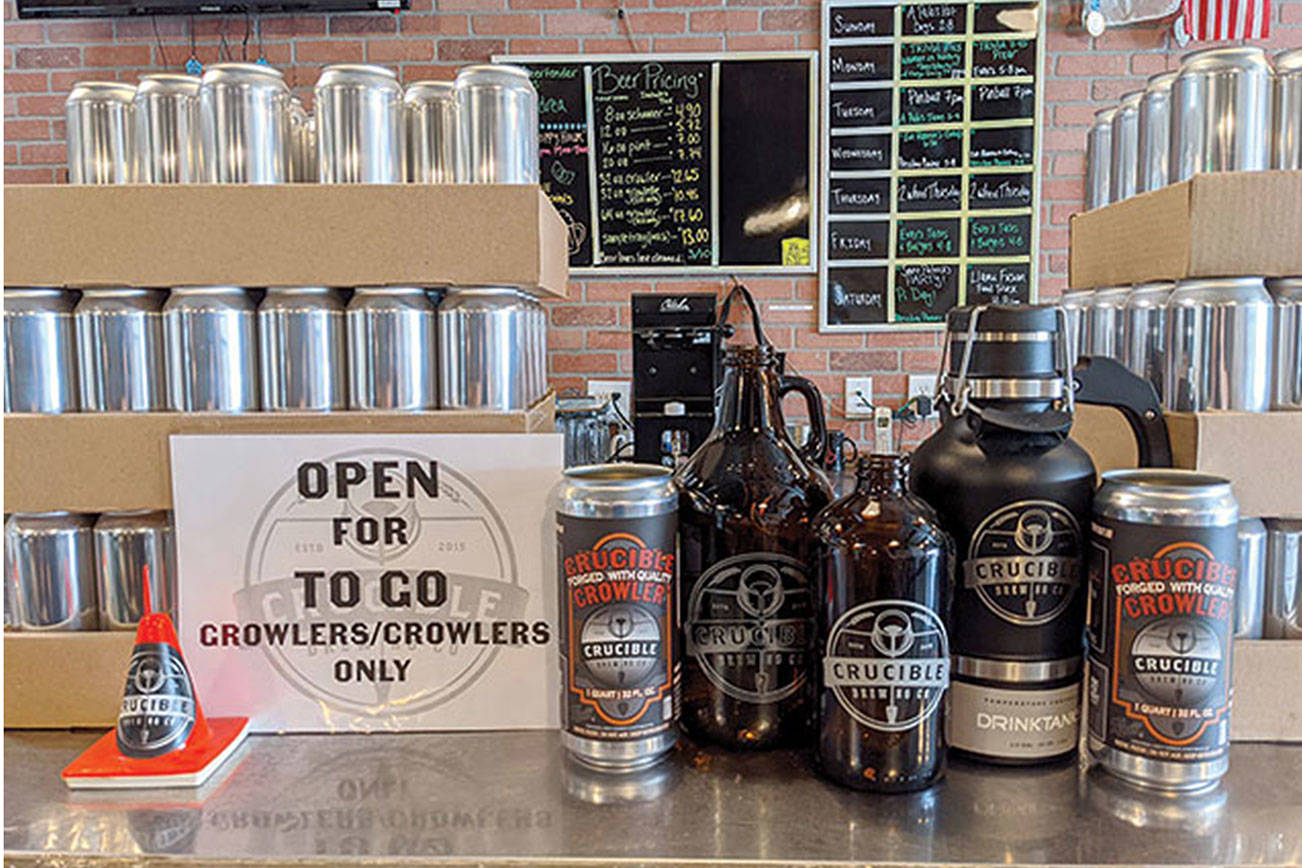
It’s been a year since we went into lockdown. Over the past 12 months, we’ve ordered takeout more than we’d like to admit, met for beers outside under a tent in the rain and fantasized about crowding into a bar and playing darts without hand sanitizer.
Like most service industry businesses, Snohomish County breweries have ridden the pandemic roller coaster. Breweries were forced to toggle between having a few customers inside one minute to ushering customers outside onto patios and sidewalks under heaters the next. It meant their largest profit margin — selling pints at the bar — was either non-existent or very limited.
Everett’s Crucible Brewing saw sales drop 85% in the first three months of the shutdown. Without bars and restaurants to sell their beer, they had to dispose of expired beer — nearly 200 kegs of it.
“I would say realistically we just survived,” said Dick Mergens, Crucible co-owner and head brewer.
Crucible took out a loan during the shutdown to cover lost income and invest in a canning machine. The brewery began canning more of its beer and found good placement in grocery and convenience stores. Despite the profit margin being considerably lower in cans and distribution, Mergens said the canning strategy allowed the brewery to stay afloat and keep brand recognition relevant.
Crucible wasn’t alone in canning. Most breweries that didn’t have crowler machines, or on-site, single-use canning machines, quickly had to purchase one, while other breweries increased their canning options. Skookum Brewery in Arlington, which regularly canned beers in pint-size four-packs, increased its options in cans and expanded distribution.
Some breweries had to get creative. When glass growlers became difficult to procure, Salish Sea purchased pallets of 32-ounce mason jars and began selling jarred beers right out of its storefront in downtown Edmonds. The items became a trend and to-go sales skyrocketed.
Package and distribution was not an option for Snohomish’s Sound to Summit, which stopped bottling its beer a few years ago. Prior to the pandemic, Sound to Summit relied almost exclusively on people coming in the door and drinking pints on site.
“Anybody in our type of category suffered significantly,” said Sound to Summit head brewer Adam Frantz. “We were conservative with our finances and plugged along.”
When the pandemic hit, Frantz stopped brewing altogether and worked through existing inventory. He began brewing again in the late summer and fall. but only sparsely and on a very intentional schedule. He has only now started to get back to a schedule that reflects anything close to normalcy.
Like many breweries, Sound to Summit expanded its outdoor seating options when the rules prohibited indoor dining again. In Marysville, 5 Rights had to erect an outdoor seating venue in a field across the alley behind the brewery. Working together with the city of Marysville, 5 Rights owner R.J. Whitlow, who was an event planner in his previous profession, was able to get the outdoor seating up in less than a week.
“I had a plan in my back pocket and, when we went back to outdoor only, I reached out to Mayor (Jon) Nehring and he called me back in 15 minutes,” Whitlow said. “We had to reimagine what people would want and do it quickly. We gave it a real block-party feel.”
Not all breweries were able to open outdoor areas for customers. Bothell’s Foggy Noggin Brewing, which operates out of owner Jim Jamison’s garage, has been closed for the whole year, with only curbside pickup each weekend.
Jamison tried to stay relevant by hosting weekly virtual tasting events on Wedne sdays and happy hour events on Thursdays. Foggy Noggin also started a bottle club, which sold out quickly, to raise some extra funds.
“We really miss having the friendship, laughter and fun each weekend inside our little tasting room,” Jamison said. “We really want to see the day when all restrictions are lifted.”
Some breweries thrived during the pandemic. 5 Rights Brewing is moving ahead with expansion plans to build a large covered and heated canopy area where the make-shift outdoor area sat this summer. The brewery is also designing an expansion space adjacent to its current taproom, made available when the neighboring coffee company shuttered its doors.
“We’ve been blessed with an amazing community, and they really helped get us through the past year,” Whitlow said. “There were times we weren’t sure if we were going to make it, but we have so many things to be thankful for.”
In Snohomish, Spada Farmhouse Brewery shut down its small downtown tasting room when the pandemic hit and focused on distribution. A few months into the pandemic, owner John Spada and his family purchased a building downtown and renovated it. Spada was able to open the large new space this past fall and launch a bottle club at the same time.
Buoyed by the strong support of its fans, Salish Sea Brewing recently went all-in on expansion, purchasing American Brewing’s taproom and brewing equipment down on the Edmonds’ waterfront. Salish Sea plans to open its second location later this year.
Despite all the challenges, new Snohomish County breweries opened and existing ones were purchased in 2020. In Snohomish, Audacity Brewing opened in November and Doug Milnor purchased Sound to Summit.
Head brewer Frantz said he’s encouraged by the new Sound to Summit ownership and is optimistic for the future.
“My mantra has always been to put the focus on the beer and let it drive the business and determine who walks in the door,” Frantz said. “The new owners are behind that 100%.”
Talk to us
"drink" - Google News
March 23, 2021 at 03:30PM
https://ift.tt/3cfnFbY
Drink This: How breweries survived without bar service | HeraldNet.com - The Daily Herald
"drink" - Google News
https://ift.tt/2STbaKe
https://ift.tt/2VWmZ3q
Bagikan Berita Ini














0 Response to "Drink This: How breweries survived without bar service | HeraldNet.com - The Daily Herald"
Post a Comment